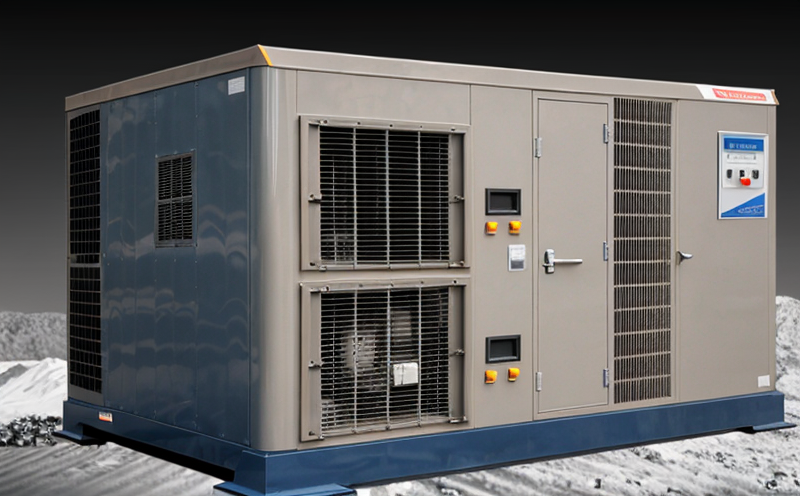JEDDEC JESD22-A118 Accelerated Thermal Aging Testing
The JEDEC JESD22-A118 standard specifies a method for accelerated thermal aging testing of semiconductors, which is essential to ensure the reliability and longevity of microchips under extreme environmental conditions. This test accelerates the aging process by subjecting devices to elevated temperatures, thereby simulating years of real-world usage in just weeks or months.
Thermal aging can degrade a semiconductor's physical structure over time, leading to decreased performance and potential failure. The JESD22-A118 method provides a standardized approach for testing the stability and durability of microchips under severe conditions. This standard is widely used in the electronics industry to ensure that products meet stringent quality and reliability benchmarks.
The test involves placing the semiconductor devices into an oven where they are exposed to temperatures ranging from 125°C to 175°C, depending on the type of device being tested. The duration can vary between 300 hours (for small devices) and up to 2400 hours for larger components. During this time, the devices undergo continuous temperature cycling, which simulates real-world conditions more accurately than static temperature exposure.
The primary objective is to identify any early signs of degradation or failure that could indicate potential issues in the design or manufacturing process. By detecting these problems early on, manufacturers can address them before products reach the market, ensuring higher reliability and customer satisfaction. This testing method helps maintain consistent product quality across different batches and production runs.
Another critical aspect of this test is its ability to predict long-term performance under extreme conditions. It provides valuable insights into how well a device will perform over extended periods without failing due to thermal stress alone. Such information is crucial for designing robust products capable of meeting demanding operational requirements in various applications, such as automotive systems, aerospace electronics, and industrial controls.
Moreover, the JESD22-A118 test helps ensure compliance with international standards like ISO 9001, which emphasizes continuous improvement and quality assurance throughout all stages of production. By adhering to this standard, manufacturers can demonstrate their commitment to delivering high-quality products that meet both current regulatory requirements and future expectations.
In summary, JEDEC JESD22-A118 Accelerated Thermal Aging Testing plays a vital role in enhancing the reliability and longevity of semiconductor devices by simulating harsh environmental conditions through controlled temperature cycling. This testing method ensures that manufacturers produce reliable products capable of withstanding extreme temperatures without compromising on performance.
Scope and Methodology
The JEDEC JESD22-A118 standard outlines a procedure for accelerated thermal aging tests intended to evaluate the reliability and durability of semiconductors under high-temperature conditions. The primary focus is on identifying potential failures due to thermal stress, which can occur during prolonged exposure to elevated temperatures.
- Temperature Range: Tests are conducted within a range of 125°C to 175°C, depending on the specific requirements for different types of devices.
- Durability Time: The duration varies between 300 hours and up to 2400 hours based on the size and complexity of the component being tested.
- Temperature Cycling: Continuous temperature cycling simulates real-world conditions more accurately than static temperature exposure, helping to detect early signs of degradation or failure.
The test aims to simulate years of actual use by exposing devices to extreme temperatures and observing their behavior over time. This allows manufacturers to identify any potential issues before products reach the market, ensuring higher reliability and customer satisfaction.
Benefits
- Enhanced Reliability: Identifies potential failures caused by thermal stress, allowing for timely corrections in design or manufacturing processes.
- Durability Assurance: Ensures that the products meet stringent quality and reliability benchmarks, even under harsh operating conditions.
- Compliance Validation: Demonstrates adherence to international standards such as ISO 9001, ensuring consistent product quality across different batches and production runs.
- Predictive Insight: Provides valuable information about long-term performance in real-world applications, helping manufacturers design robust products capable of meeting demanding operational requirements.
The JEDEC JESD22-A118 Accelerated Thermal Aging Testing offers significant benefits to semiconductor manufacturers by providing a standardized approach for assessing the reliability and durability of their products. This testing method ensures that companies produce reliable, high-quality semiconductors capable of withstanding extreme temperatures without compromising on performance.
Why Choose This Test
- Standardized Approach: The JESD22-A118 method provides a consistent and reliable way to test the reliability of semiconductors under severe conditions.
- Early Detection: Identifies potential issues early in the development process, allowing for timely corrections before products reach the market.
- Long-Term Performance: Predicts how well a device will perform over extended periods without failing due to thermal stress alone.
- Quality Assurance: Ensures that manufacturers produce reliable and high-quality semiconductors capable of meeting demanding operational requirements in various applications.
The JEDEC JESD22-A118 Accelerated Thermal Aging Testing is an essential tool for semiconductor manufacturers looking to enhance the reliability and longevity of their products. By choosing this test, companies can demonstrate their commitment to delivering high-quality products that meet both current regulatory requirements and future expectations.





